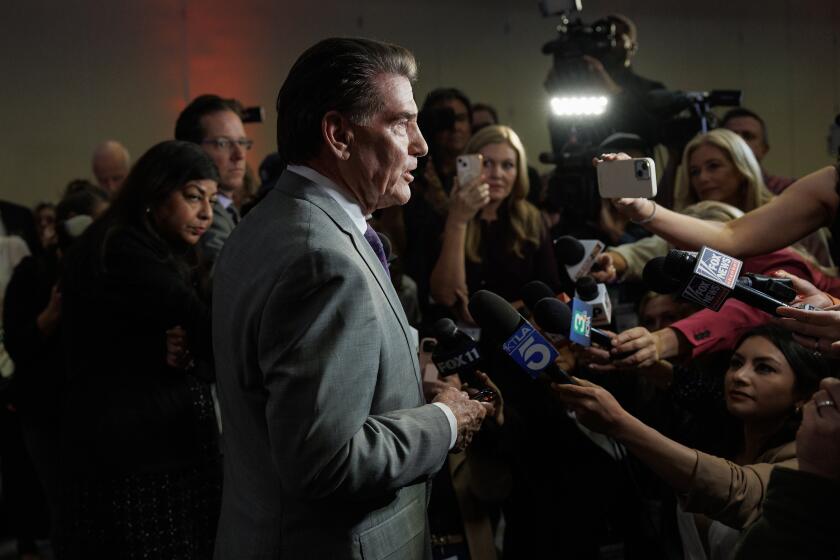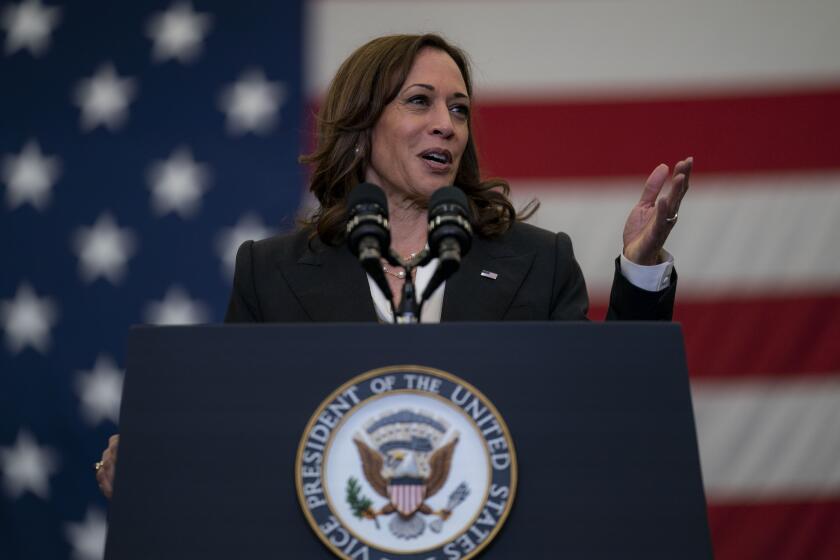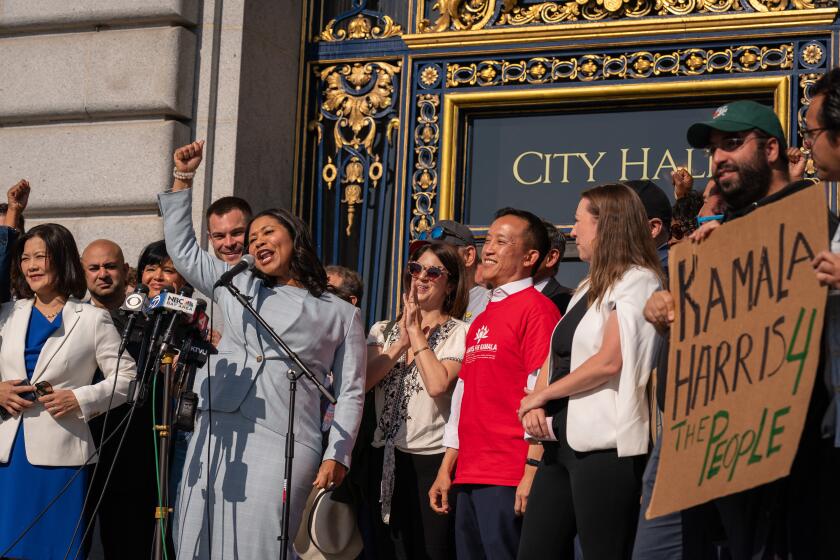Acting as if It’s in the Bag
All but declaring himself California’s next governor, Arnold Schwarzenegger on Wednesday triumphantly announced a 10-step plan for his first 100 days in office and declared that if legislators don’t follow his lead, he’ll seek approval for his proposals through the initiative process.
“I am not here today to talk about campaigning,” Schwarzenegger, hoarse from the campaign, told an audience of several hundred local Republicans at Sacramento’s Memorial Auditorium. “I’m here today to talk about governing.”
Schwarzenegger’s speech lasted just 12 minutes and his plan ran to just one page of paper, but it was significant for its tone and purpose -- compiling the disparate proposals of his campaign into one speech and presenting it under the mantle of a presumed governor-elect.
Not surprisingly, the speech infuriated aides to Gov. Gray Davis, who said it was presumptuous for Schwarzenegger to be looking beyond next Tuesday’s election.
“I think it is profoundly disrespectful to the people of California to be measuring the drapes at the Capitol before voters have had a chance to make a decision,” said Peter Ragone, communications director for the Davis campaign. “You don’t take a victory lap a week before the election.”
Davis spent the day campaigning for the votes of Democrats and independents whose support is essential for him to stand a chance of retaining his office.
In a speech at Ventura County’s Ahmanson Ranch, which a state agency is buying to stave off development, the governor repeatedly reminded listeners that former Republican Gov. Pete Wilson and many of his appointees are advising Schwarzenegger.
“I’m going to spend the remaining six days having a conversation with Democrats and independents,” Davis said, “telling them why I think the values I believe -- protecting the environment, protecting workers, protecting workplace safety, growing our economy, providing resources for public safety in the state -- are the values that resonate with Californians.
“I hope and believe they’ll rally around our cause, believing a recall is not in their best interests and not wanting to see the governor’s office turned over to Mr. Schwarzenegger and the recycled Wilson team.”
Both the governor and Lt. Gov. Cruz Bustamante campaigned separately with retired Gen. Wesley Clark, now a Democratic candidate for president. Both sought to downplay recent polls, including a Times poll, showing Davis trailing in his bid to beat the recall and Schwarzenegger leading both Bustamante and state Sen. Tom McClintock (R-Thousand Oaks).
For his part, McClintock admitted to being frustrated by the polls, which paradoxically show that voters widely admire him, even as most say they won’t vote for him. While he promised to keep fighting in the remaining days of the campaign, there was an air of resignation in some of his remarks, as when he said that he would work diligently with Schwarzenegger should the actor prevail.
“I will support him to the hilt,” McClintock said. “There’s not personal animosity; I actually personally like the guy. But I am very skeptical of the team he has surrounded himself with.”
From a 135-candidate free-for-all a month ago, the campaign to recall and replace Davis has pared itself down to a simple contest in its final days. The Davis campaign presents it as one of Davis vs. Schwarzenegger. Increasingly, the Schwarzenegger campaign is trying to frame it as a foregone conclusion.
The staging of Wednesday’s event in Sacramento reinforced this impression. Rather than stand in front of a “Join Arnold” banner, as he has been doing in campaign events, Schwarzenegger stood in front of a row of palm trees -- creating an iconic image of California, albeit one somewhat out of place in the Sacramento auditorium.
“We are ready to take office,” Schwarzenegger said in the conclusion to his speech. “We are ready to take action. We are ready to return California to the people.”
Inside the campaign, conversation has begun to turn to the transition. Schwarzenegger’s economic team has stepped up the pace of its meetings, and a team led by a Stanford economist is ready to roll out plans for restructuring the state’s debt, aides said.
Former Los Angeles Mayor Richard Riordan would work on education issues during the transition, and former Republican gubernatorial nominee Bill Simon Jr. would be involved in economic issues, campaign officials and other Republicans said. Both spoke at the auditorium before Schwarzenegger’s speech.
Aides, while careful to note they “aren’t popping champagne yet,” are discussing what a Schwarzenegger staff may look like. Campaign co-manager Bob White and other top officials are likely to stay on to lead a transition, but Schwarzenegger, a politician for just eight weeks, does not have a longtime cadre of political aides on which to draw for a gubernatorial staff.
Schwarzenegger will spend the campaign’s final five days on the road, beginning with a four-day bus tour that starts today in San Diego and will visit “various villages and towns,” he said. On Monday, Schwarzenegger will conduct a rapid “fly-around,” visiting cities throughout the state.
Campaign officials said they plan to close out the last few days before the election with a series of positive TV commercials, replacing ones that criticize his rivals. The campaign plans to mix pro-Schwarzenegger ads with pro-recall ads at a ratio of about two-to-one.
Davis, meanwhile, continued a campaign in which he has tried to delicately balance criticism of Schwarzenegger with a recitation of his accomplishments, which he hopes will appeal to Democrats in particular.
Before his Ahmanson Ranch appearance, Davis had appeared at a Hollywood rally with Clark, who noted that they had both served in the Vietnam War. “We’re proud of your public service,” Clark told the governor. “We’re proud of your spirit.”
Clark is the latest in a string of Democratic presidential hopefuls to campaign for Davis -- an indication of the importance the national party attaches to the election. Also Wednesday, House Democratic Leader Nancy Pelosi of San Francisco and U.S. Sen. Barbara Boxer (D-Calif.) spoke out against the recall and called on voters to back Bustamante on the second part of the ballot.
“This election is about a lot more than star power and muscles and all the rest,” Boxer said in a conference call with reporters. “It’s about real people and the real challenges they face.”
Bustamante appeared with Clark in an afternoon event at the Century Plaza Hotel, where the general endorsed him as “a remarkable public servant” who has “enormous leadership potential.”
Despite the polls that show him trailing Schwarzenegger, Bustamante said his campaign would continue to mobilize core Democratic groups, such as Latinos, blacks, labor unions, environmental groups and women.
“To drop out now would deflate that effort,” he said, adding that internal campaign polls show him “only a couple of points down.”
If elected governor, he said, “Every time I sign a bill, every time I veto a bill, I’m going to harken back not to my political experience, but to my personal experiences: how to help that family with six children.”
McClintock, turning to his base of conservative support, went on the Sean Hannity radio talk show and continued to lambaste state Republican Party leaders, who have endorsed Schwarzenegger.
Asked if he didn’t expect some retribution from the party for refusing to withdraw from the race and support Schwarzenegger, McClintock said: “I don’t negotiate with terrorists.” He said that word describes those who “make political threats.”
If he were not in the race, McClintock said, there would be no major candidate who favors Prop. 54 and opposes driver’s licenses for illegal immigrants, abortion and gun control.
“My job in six days is simply to convince people it’s all right to vote your conscience ... rather than somebody else’s political calculations,” he said. “If I’m unable to do that, we fall short.”
Schwarzenegger’s speech in Sacramento continued his pattern of emphasizing positives and avoiding mention of his rivals in the race to replace Davis. It included one remark pointed at the governor. “The question really is: What would a Davis administration do in the next 100 days?” Schwarzenegger said. “They say no to the recall to take us back. I say yes to California. I will move us forward.”
Central to Schwarzenegger’s plan is a pledge to make cuts to the state budget, although the candidate’s speech offered no new information on what programs he would slash.
The 10 steps of the plan cobbled together familiar proposals from his campaign, demands for givebacks from Indian tribes and unions who are unlikely to go along, along with a few new wrinkles on government openness and disclosure. Each step would either widen the budget deficit or require a significant retreat by a powerful constituency.
Republicans and Democrats alike said that with a Democratic Legislature, passing even a couple of the steps would be difficult. State Senate Minority Leader Jim Brulte said Schwarzenegger could win adoption of the plan “through the sheer force of personality,” but some budget and political experts see the 100-day plan as more of a campaign document than a realistic program for governance.
Bill Carrick, a Democratic political consultant who is not working in the recall race, said he thought Schwarzenegger’s education and workers’ compensation priorities might pass the Legislature, but that both are major initiatives that could take time. His pledges to obtain concessions from public employee unions “could shut down your government for three years.”
Schwarzenegger himself conceded that a number of the 100-day plan’s steps will likely to have to be approved on the March 2004 ballot.
*
Times staff writers Sue Fox, Daryl Kelley and Mitchell Landsberg contributed to this report.
*
(BEGIN TEXT OF INFOBOX)
AD WATCH
Californians Against the Costly Recall
Californians Against the Costly Recall has launched a second Spanish-language television ad in support of Gov. Gray Davis. In the ad, L.A. City Councilman Antonio Villaraigosa urges voters to reject the recall. The campaign would not say how much it is spending on the ad but said it would run in the Los Angeles market.
Title: “Esperanza”
Producer: Doak, Carrier, O’Donnell & Associates
Script: Villaraigosa is seen talking to people on the street, in a classroom and with Davis. Davis is then shown in a classroom and on a stage signing the bill giving illegal immigrants the right to have driver’s licenses. Villaraigosa says: “Two years ago we ran a campaign of hope to open up doors. Now, they’re trying to close them. Gov. Davis stood by us then; now it’s time to stand by him. His Healthy Families program provided health insurance for our children, he got more money for our schools and he supported the driver’s license bill. I’m voting ‘no’ on the recall; I hope you will too.”
Accuracy: The campaign Villaraigosa appears to be referring to is his 2001 run for mayor of L.A. Davis supported Villaraigosa, who lost to James Hahn. Davis did recently sign a bill allowing illegal immigrants to get driver’s licenses but opposed a similar bill last year, citing homeland security concerns. Critics said his reversal amounted to pandering to Latino voters. The Healthy Families program, which provides insurance to children in need, began in the Pete Wilson administration but significantly expanded under Davis. Education spending has also significantly increased under Davis.
Analysis: The most recent L.A. Times poll shows Latinos are split over whether he should be recalled. Villaraigosa is a popular figure in the Latino community, so he’s a logical choice to speak up for Davis. The policies Villaraigosa cites represent state services that affect Latinos. But the ad does not mention some of the more controversial aspects of Davis’ tenure, such as the budget gap and the energy crisis.
From Times staff reports
Los Angeles Times
More to Read
Get the L.A. Times Politics newsletter
Deeply reported insights into legislation, politics and policy from Sacramento, Washington and beyond. In your inbox three times per week.
You may occasionally receive promotional content from the Los Angeles Times.






